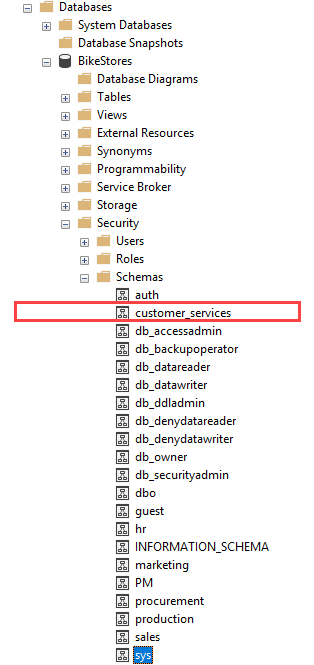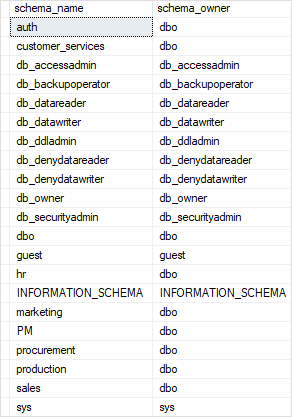Summary: in this tutorial, you will learn how to use the SQL Server CREATE SCHEMA to create a new schema in the current database.
What is a schema in SQL Server
A schema is a collection of database objects including tables, views, triggers, stored procedures, indexes, etc. A schema is associated with a username which is known as the schema owner, who is the owner of the logically related database objects.
A schema always belongs to one database. On the other hand, a database may have one or multiple schemas. For example, in our BikeStores sample database, we have two schemas: sales and production. An object within a schema is qualified using the schema_name.object_name format like sales.orders. Two tables in two schemas can share the same name so you may have hr.employees and sales.employees.
Built-in schemas in SQL Server
SQL Server provides us with some pre-defined schemas which have the same names as the built-in database users and roles, for example: dbo, guest, sys, and INFORMATION_SCHEMA.
Note that SQL Server reserves the sys and INFORMATION_SCHEMA schemas for system objects, therefore, you cannot create or drop any objects in these schemas.
The default schema for a newly created database is dbo, which is owned by the dbo user account. By default, when you create a new user with the CREATE USER command, the user will take dbo as its default schema.
SQL Server CREATE SCHEMA statement overview
The CREATE SCHEMA statement allows you to create a new schema in the current database.
The following illustrates the simplified version of the CREATE SCHEMA statement:
CREATE SCHEMA schema_name
[AUTHORIZATION owner_name]
Code language: SQL (Structured Query Language) (sql)In this syntax,
- First, specify the name of the schema that you want to create in the
CREATE SCHEMAclause. - Second, specify the owner of the schema after the
AUTHORIZATIONkeyword.
SQL Server CREATE SCHEMA statement example
The following example shows how to use the CREATE SCHEMA statement to create the customer_services schema:
CREATE SCHEMA customer_services;
GO
Code language: SQL (Structured Query Language) (sql)Note that GO command instructs the SQL Server Management Studio to send the SQL statements up to the GO statement to the server to be executed.
Once you execute the statement, you can find the newly created schema under the Security > Schemas of the database name.

If you want to list all schemas in the current database, you can query schemas from the sys.schemas as shown in the following query:
SELECT
s.name AS schema_name,
u.name AS schema_owner
FROM
sys.schemas s
INNER JOIN sys.sysusers u ON u.uid = s.principal_id
ORDER BY
s.name;
Code language: SQL (Structured Query Language) (sql)Here is the output:

After having the customer_services schema, you can create objects for the schema. For example, the following statement creates a new table named jobs in the customer_services schema:
CREATE TABLE customer_services.jobs(
job_id INT PRIMARY KEY IDENTITY,
customer_id INT NOT NULL,
description VARCHAR(200),
created_at DATETIME2 NOT NULL
);
Code language: SQL (Structured Query Language) (sql)In this tutorial, you have learned how to use the SQL Server CREATE SCHEMA statement to create a new schema in the current database.